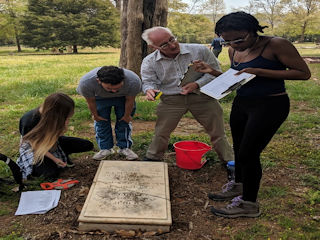
Professor Harold Mytum visited Athens as part of his collaboration with Dr. Jennifer Birch, Department of Anthropology, UGA, supported by a UGA- Liverpool faculty exchange initiative.
Harold led students from the Departments of Anthropology and Classics through an experiential learning exercise in monument recording in the Old Athens Cemetery. Students used the recording forms and coding sheets that are also being used by Liverpool students at Toxteth Park Cemetery, demonstrating the international applicability of Harold’s recording system that has become the industry standard for heritage professionals in England and Wales, but which can now be developed to be of global applicability.
Harold also gave a talk entitled When People Became Part of History: Material evidence for the Application of Linear Time in the British Isles and North America as part of the Department of Anthropology’s Speakers Series. This demonstrated how the development of post-medieval memorials formed part of a wider cultural change in which names and dates were placed on many categories of material culture including ceramics, glass bottles, leadwork and datestones on buildings. This trend both reflected and spread an increased awareness of individual agency in the creation of local and national histories, and is an example of the new Departmental research area of Materiality of/and Text. Liverpool students become familiar with the artefact categories in Harold’s talk during their cemetery recording and on the Norton Priory training excavations.
Harold and Jennifer consider that whilst archaeological field training teaches discipline-specific knowledge as well as broadly-relevant competencies, it is unclear from published studies how these objectives are tied to assessment and reflection during the field-school training process. Jennifer said: “We first met at a conference session concerned with Biographies of Enclosure, where we discovered that we both also had a strong interest in the pedagogy of field training and decided that a collaborative approach to delivering this would be worthwhile.”
Harold said “We are exploring how the integration of authentic assessment within our redesigned student fieldwork can enhance the learning experience and encourage greater reflexivity amongst all participants in this research. The Norton Priory excavations in Runcorn, and equivalent field training in Georgia, will form a basis for our developing research programme. Graveyard and cemetery recording can likewise be used to develop students’ generic employability skills”.